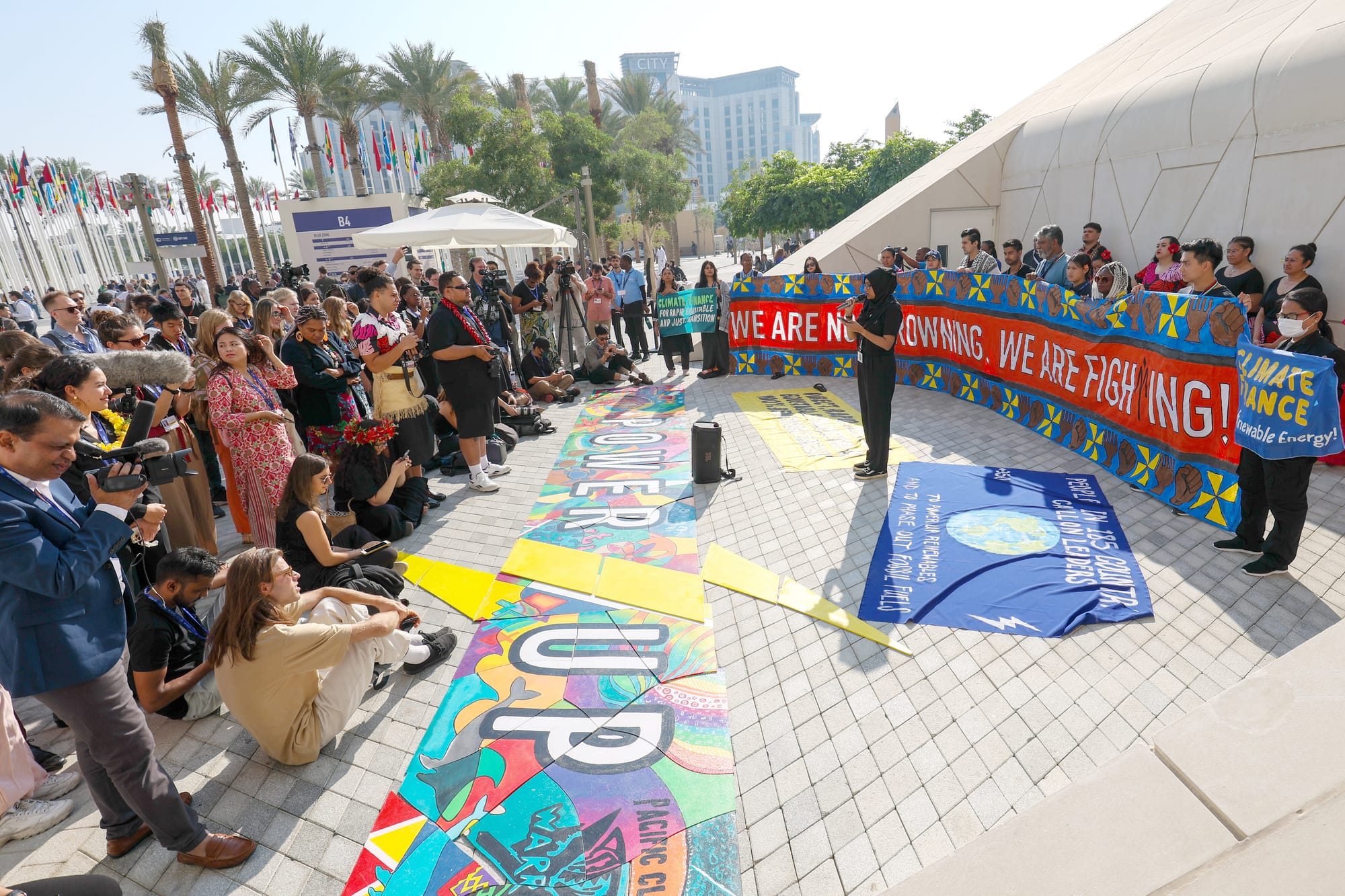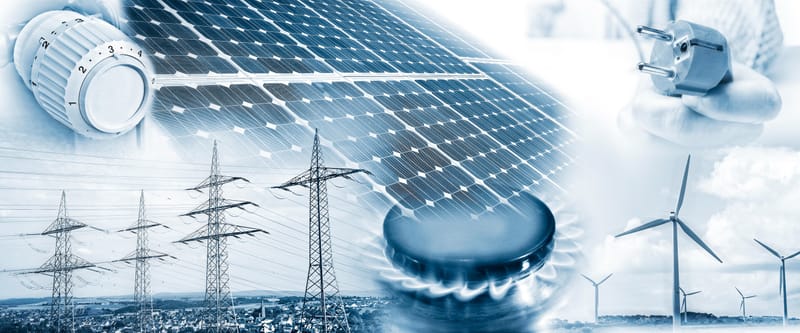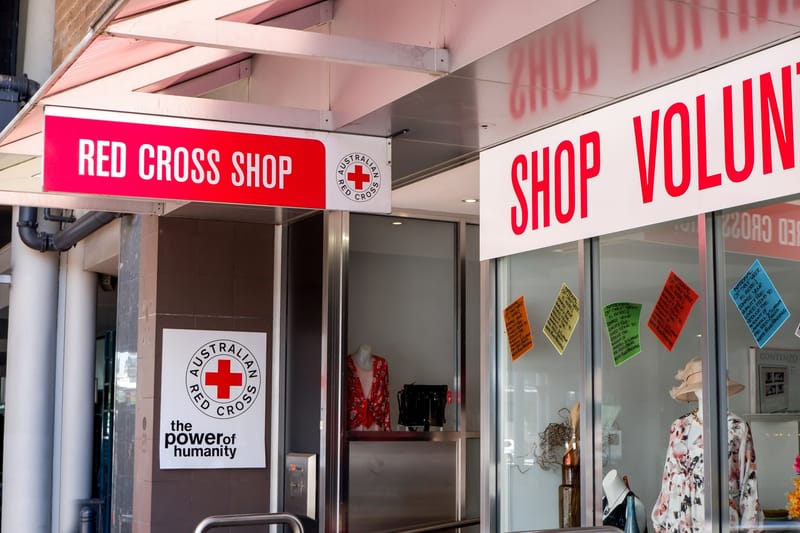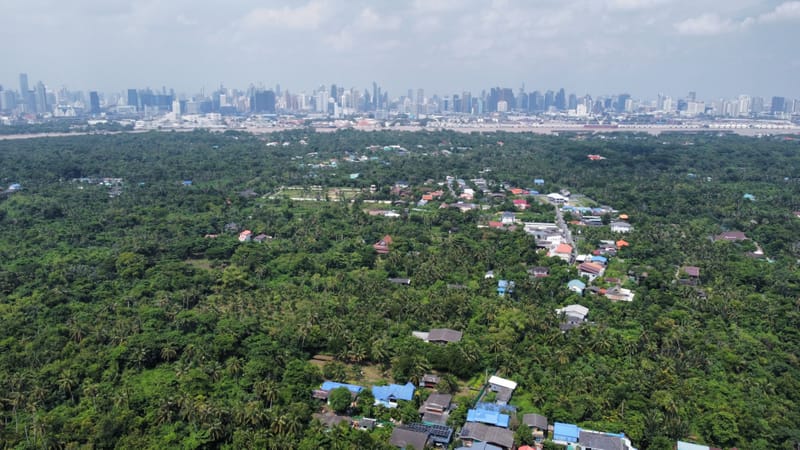
A couple of months ago, the largest global event for climate change, the UNFCCC Climate Change Conference (COP28) took place in Dubai, and it was encouraging to see the number of youth activists taking part in it.
Young people are powerful advocates for a just transition to decarbonisation on the world stage. They speak out to hold governments and institutions to account as custodians of our future through the lens of human rights and climate justice.
For example, youth have unwaveringly focused the COP’s attention on the existential plight of developing nations, including our Pacific neighbours.
In Dubai at COP28, youth from all over the world led important conversations as they continued to advocate for those disproportionately impacted by climate change – that is, those in conflict zones, First Nations peoples, youth, and marginalised communities in the least-developed nations.
But what does it feel like to attend COP as a young person?
In this article, we asked three Monash youth delegates to share their experiences. These youth ambassadors played important roles at the 28th Conference of the Parties (COP), the world’s most significant global forum for climate action.
Hamidullah Nadeem
Digital Communications Coordinator, MBA candidate
Attending COP28 was a remarkable experience. It connected me with like-minded individuals and organisations from across the globe. As a first-time attendee, I was amazed by the diverse crowd from various regions, all sharing their contributions and initiatives to combating climate change.
Given the scale of COP28, while it was challenging to fully immerse myself in every aspect of the event, my best moment was interacting with fellow young students in an official UN side event where we discussed the role youth and universities can play in taking climate action.
Additionally, organising a session at COP28 specifically highlighting Afghanistan's susceptibility to climate challenges was another proud moment for me.
On a more personal note, my emotions were tinged with a sense of duty, stemming from my origins in Afghanistan – a nation profoundly impacted by climate change’s devastating effects. It’s distressing to witness Afghanistan’s marginalisation on such a pivotal global stage, often caused by geopolitical tensions. I wish for Afghanistan to receive the support it desperately needs, rather than navigating these immense challenges on its own.
My biggest hope is that countries commit to the consensus and commitments made at the COP28 to achieve the Paris Agreement target of 1.5° C.
Kaaviyan Pathmasiri
Director of Partnerships for the Monash Energy Club, final-year Bachelor of Engineering (Honours) specialising in mechanical engineering
Being present at COP28 as a young individual evoked both inspiration and a degree of disappointment. The sheer scale of the event, with world leaders and experts converging, was undeniably awe-inspiring.
However, it carried the weight of the realisation that our generation is inheriting the repercussions of decisions made by predecessors, fuelling a heightened sense of purpose and determination within me.
A defining moment was the engagement with fellow young activists during an official UNFCCC side event. Addressing the empowerment of youth in climate action, solutions, and global policy, this collaborative exchange solidified the belief that young activists are indispensable in steering toward a more sustainable and equitable future worldwide.
Despite this, the slow decision-making and challenges in achieving consensus among nations was disheartening. The bureaucratic hurdles and political posturing seemed contradictory to the climate crisis’ pressing urgency.
This contradiction was accentuated by hosting COP28 in a petrochemical state, where the imperative to phase out fossil fuels clashed with persisting reliance on them. This frustration underscores more decisive and immediate action, especially to protect the most vulnerable, such as our Pacific neighbours.
Acting upon the urgency of our involvement in sustainability is not a mere choice, but an absolute necessity for the planet’s survival. The potency of our collective voices, whether expressed in local community meetings or global platforms like COP, becomes a catalyst for change.
As youth, our unique perspective and vested interest in the future make our involvement indispensable in the ongoing fight against the climate crisis.
Jessica Walter
Project Coordinator, Citarum Action Research Program (CARP), Monash Sustainable Development Institute, Monash Art, Design and Architecture
What did it feel like to attend COP as a young person?
It was a privilege to attend COP28, but it was also eye-opening to walk among officials, experts, and policymakers and feel like a small fish in a huge pond.
This was, however, motivating and made me aware that as a young person at COP, I was part of a minority group – while being present in discussions that were more than relevant to young people. I realised I had a responsibility to be seen at events, and to show others that young people want to and need to be a part of these high-level, international discussions.
And not only should they have a seat at the table, but be asked to speak and listened to when doing so.
What was your personal highlight?
A personal highlight for me was attending sessions that discussed the importance of rare earths, and industries such as agriculture and mining.
However, through a lens that focused on how to make these areas more sustainable and healthier for both people and the planet, instead of only highlighting the negatives. It is essential to have these discussions and provide such understanding, as these areas of industry are fundamental to necessary transitions in society and the overall sustainability of mankind and the Earth.
What was your biggest frustration?
When attending large international forums, the messages and needs of rural and remote communities can become lost. It can be frustrating that the decisions being made at COP can directly impact those who are truly feeling the impacts of climate change.
However, their voices, needs, and struggles can sometimes be hard to find among the flood of people, topics, and conversations.
It’s easy to become swept up in solutions to combat climate change without considering the consequences and outcomes for all stakeholders involved in the process. That is why changes and solutions must be met through the process of just transitions.
There needs to be more focus at events such as COP, on grassroots communities, industries, and the livelihoods of individuals that are being impacted by sustainable transitions.
A pathway for people from these areas should also be provided to enable their attendance at COP, because, for many, such individuals do not have the resources initially to get to the table, let alone have the opportunity to speak at it.
What climate issues or events did you personally contribute to, and why?
My interests are with rural and remote communities, grassroots research, just transitions, and the impact of climate change on different cultures, groups, and industries which are not always considered in the sustainability discussion.
The majority of my involvement at COP28 surrounded grassroots solutions and the importance of Indigenous knowledge and people in the sustainability space. A key session was the “Global Indigenous Voices: Navigating Success, Confronting Challenges and the Role of Institutions in Just Transitions”, which I co-hosted and organised with Pro-Vice-Chancellor (Indigenous) Tristan Kennedy.
The session was highly attended, including by Australia’s Ambassador for First Nations People, Mr Justin Mohamed. It brought together Indigenous people from around the globe to have an open and raw discussion that highlighted the significance of Indigenous knowledge and the impacts of climate change on Indigenous people globally.
This session and my involvement across the entirety of COP28 reinforced my passion for research and the implementation of solutions to assist people in these areas.
Why do you think it is important for young people to engage in local to global climate action, and do you have any advice for others who want to get involved?
Discussing the impacts of climate change is directly discussing the futures of young people and the generations to follow. It is relevant to us; it will impact us, and we need to address these issues collectively – that’s why it is important to become involved.
To do so, in local and global conversations, seek groups already involved and join their activities. Remember to maintain an open mind, and be aware that not everyone will agree with your thoughts and may have a different agenda. But that is OK. This provides further learning for yourself and others to find a place of middle ground.
Climate change is an issue that affects everyone, no matter what corner of the globe they are from. However, remember that it may affect others more significantly than some, and those are not always the people highlighted or being represented in the same discussions which you are privileged to be a part of.
Closing in controversy
COP28 drew to a close with some controversy and last-minute progress. While fossil fuels are not being explicitly phased out or even phased down in the text, almost 200 countries did agree to “transition” away from fossil fuels.
Further, an agreement was reached to establish a fund enabling richer industrialised nations to compensate poorer nations for the impacts of climate change on their cultures and livelihoods. The creation of this loss and damage fund and its deployment is one of the biggest achievements of the COP talks in recent years. However, the financial pledges so far fall short by several orders of magnitude.
Young people have played a large role in advocating for some of the biggest breakthroughs. For example, there have been some significant outcomes in the past, such as the Paris Agreement.
Youth ambassadors have also helped focus the world’s media on global inequality and injustice, encouraging us to look beyond our national borders and interests. Young people have been particularly powerful in raising public awareness of the socio-scientific and geopolitical context of climate change, putting governments under pressure to leave no one behind.
Most importantly, COP is more than a process for young people – it’s a community. COPs generate international networks that support local to global climate action and leadership among youth. These networks nurture emerging climate actors and advocates, provide support when the going gets tough and progress is slow, enable knowledge exchange, and amplify diverse voices across the global north and south.
These youth communities lead to greater intercultural exchange and understanding, transforming participants.
COP is a community that anyone can get involved with, including from home. It develops global citizens and leaders who act to support Earth’s life support systems and protect human rights and wellbeing.





